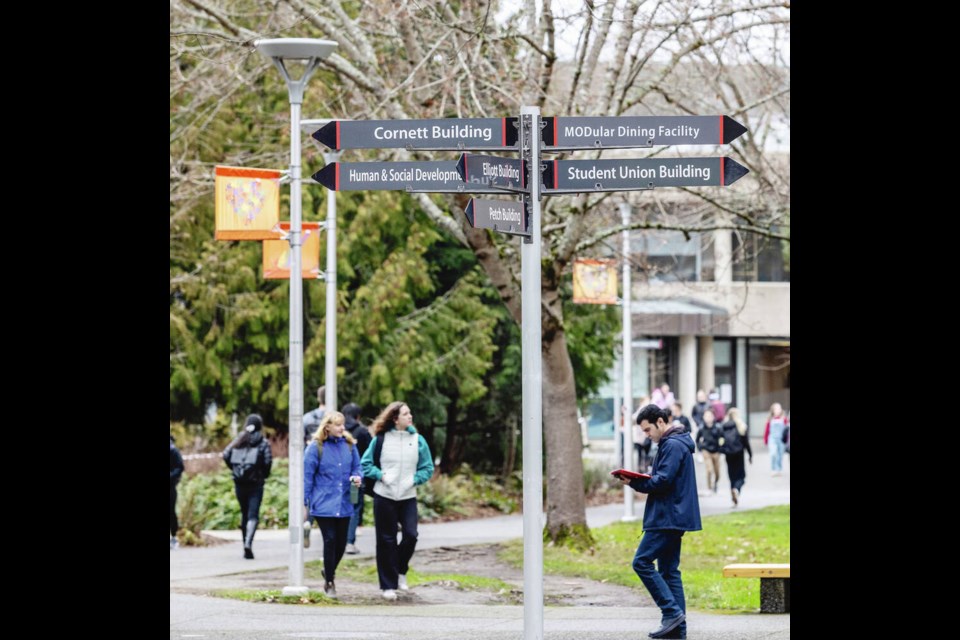The University of Victoria, Vancouver Island University, Camosun College and other post-secondary institutions are grappling with a decline in enrolment in the wake of the COVID-19 pandemic.
UVic says its international enrolment is down about 16 per cent compared to the previous year, although domestic enrolment is expected to be steady and to reach targets.
Vancouver Island University says domestic and international enrolments have not yet returned to pre-pandemic levels, and record inflation has also hurt its financial situation. As a result, Vancouver Island University is looking to “significantly limit spending” in its 2023-24 budget, which is expected to be finalized in March.
At Camosun, enrolment for the fall of 2022 was down by around four per cent from the previous fall, the college said in a statement.
While the number of international students at Camosun is on the rise, it said, it still hasn’t reached pre-pandemic levels.
Another factor, the college said, is the fact that the region has some of the lowest unemployment rates in the country.
“Enrolment in post-secondary education is typically inverse with the economic cycle, where low unemployment usually impacts trades and vocational education, as well as demand for adult basic education and upgrading,” the college said.
UVic also cites a recovering labour market that has increased employment opportunities for prospective students as a factor in enrolment declines, along with federal delays in processing international study permits.
Immigration, Refugees and Citizenship Canada said that although it set a record in 2022 when it processed 739,000 study permits, issues such as aging technology have led to a backlog in applications that it’s dealing with through improved equipment and the hiring of more staff.
The enrolment declines are being felt in post-secondary institution budgets.
UVic, which currently has about 22,000 students, said in a statement that more than 90 per cent of the school’s operating budget is directly tied to the number of tuition-paying students.
A budget outlook sent to UVic staff from vice-president academic and provost Elizabeth Croft and Kristi Simpson, vice-president finance and operations, said the hiring pause helped avoid a budget deficit — which the provincial government does not allow universities to have.
Still, the university has advised faculty and staff to expect a four per cent budget reduction for 2023-24. Operating expenditures for 2022-23 are $463 million.
The university said it’s taking steps to increase enrolment with beefed-up student recruitment and offering more scholarships and bursaries to make education more affordable. Tuition for the current school year for the majority of arts and sciences programs is $6,045 for domestic students, and $27,836 for international students.
“We also continue to foster and grow our long-term partnerships with schools all over the world — including in Europe, Asia and North and South America — to welcome students to do their undergraduate and graduate studies here at UVic,” it said in a statement
The new West Shore campus is also expected to help grow enrolment. A partnership involving UVic, Royal Roads University and Camosun, with funding support from the provincial government and City of Langford, the new campus is scheduled to open for students in 2024.
The Professional Employees Association, which represents about 1,200 academic and administrative staff at UVic — including program co-ordinators, academic assistants and laboratory assistants — wants to ensure that budget cuts don’t harm its members or affect students’ experience, said labour-relations officer Samantha Montgomery.
“We don’t know what the impact will be, and it’s been almost a decade since we’ve had anything like this,” Montgomery said. “They’ve lifted the hiring hold and review, but then announced the need for base budget reductions.”
When UVic was dealing with a budget deficit in 2013, it cut about 80 faculty and staff — although 36 of those positions were already vacant. About 25 Professional Employees Association members were laid off.
Montgomery said some unions are still in negotiations with the university, and it’s the Professional Employees Association’s understanding that the projected budget reduction “won’t undo the terms of the deals that we’ve reached or are about to reach.”
There could still be staffing impacts, however, “if certain units can’t weather the storm,” she said, calling for more provincial funding.
“That’s where, from our perspective, we need a strong commitment from the provincial government to help make sure that post-secondary institutions aren’t harmed by declining enrolment.”
>>> To comment on this article, write a letter to the editor: [email protected]



